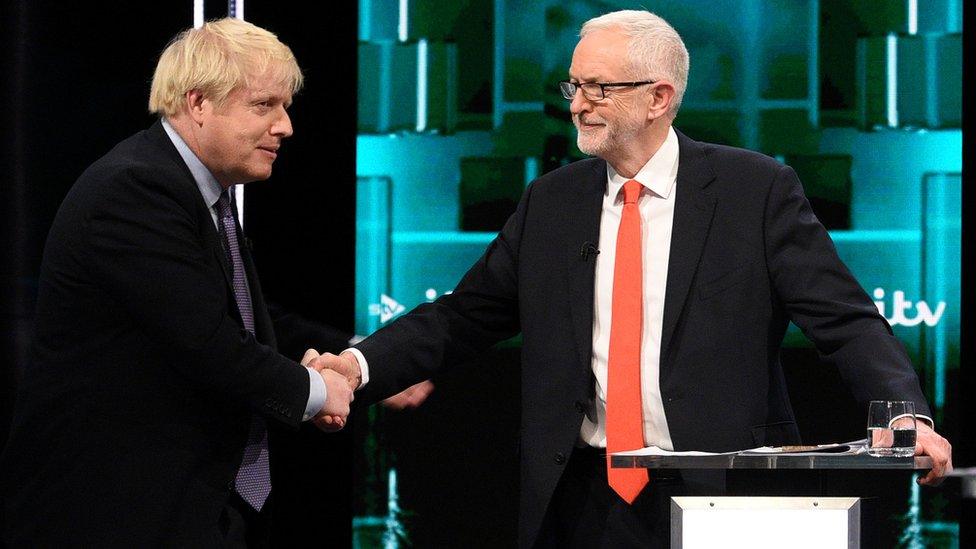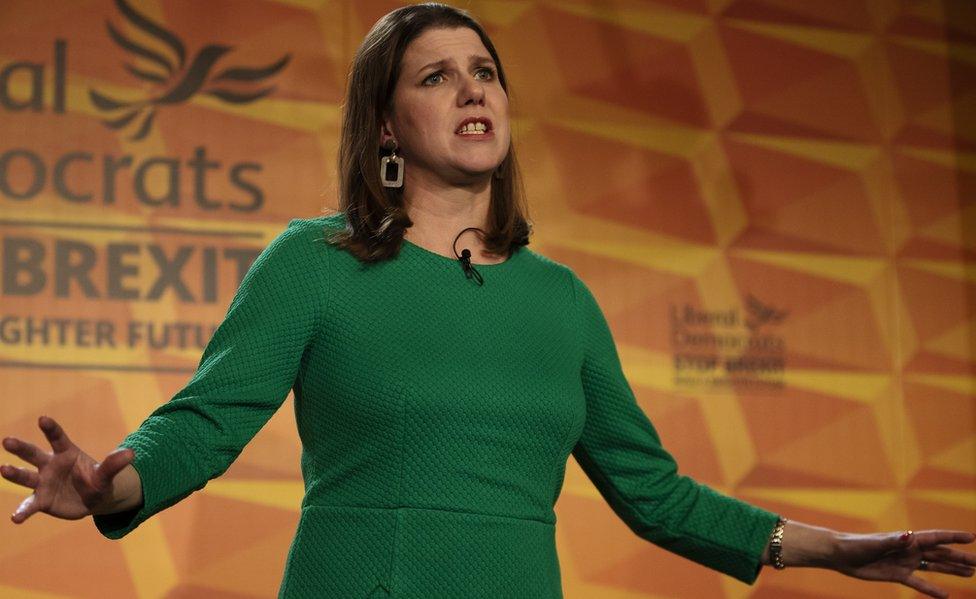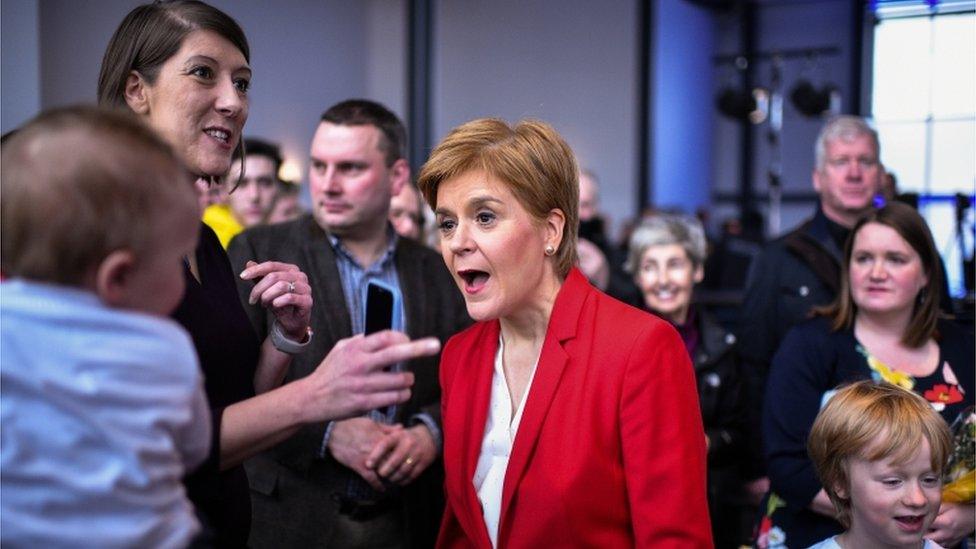General election 2019: Moments of ridicule in UK's unusual battle
- Published

Tuesday's debate pitted Conservative Prime Minister Boris Johnson against Labour's Jeremy Corbyn in one-hour tight format
Nobody could ever accuse Brits of being overly reverential towards those already in or aspiring to be in power: a generalisation neatly demonstrated in the key moments of the UK general election in the past seven days.
I'm talking about a studio audience laughing at both Boris Johnson and Jeremy Corbyn during the first televised debate of the election. Not in a "that was funny" kind of way, but a "you sound ridiculous/totally unbelievable" kind of way.
And what provoked such derisive laughter?
It was the moment Mr Johnson replied "yes" when asked whether he thought telling the truth was important; and when Mr Corbyn claimed his Labour Party's Brexit policy was clear and that a four-day week for workers could be achieved by higher productivity.
Boris Johnson and Jeremy Corbyn locked horns over the NHS, Brexit and the Royal Family
I pick this episode out because the audience reaction almost certainly reflected a wider and uncomfortable truth about this election: namely that it's less about who would be the most popular leader and/or party but who is the least unpopular.
National opinion polls consistently suggest that neither Mr Johnson nor Mr Corbyn are particularly liked or trusted.
One fairly typical bit of polling I saw suggested Jeremy Corbyn had a favourability rating of -39%. That's because while 23% had a favourable view of him, 62% had an unfavourable one. The same poll suggested Mr Johnson also had a negative ranking, in his case -9%.
As to the debate itself, the verdict was that there was no clear winner, with no knockout blows and no major gaffes.
Indeed most of the reaction to it focused on how the Conservative Party had renamed one of its Twitter accounts during the debate to something called FactCheckUK, which was roundly condemned as dishonest and misleading by their political opponents and indeed by Twitter itself.
Allow X content?
This article contains content provided by X. We ask for your permission before anything is loaded, as they may be using cookies and other technologies. You may want to read X’s cookie policy, external and privacy policy, external before accepting. To view this content choose ‘accept and continue’.

Perhaps the most eye-catching defence of the party's behaviour came from Foreign Secretary Dominic Raab, who said "no-one gives a toss about social media cut and thrust".
Hard to imagine the Duke of Wellington or Lord Palmerston, or other famous foreign secretaries employing quite that turn of phrase, but there was of course no Twitter in the 19th Century.
A week of campaign pledges
The other notable moments of the week included the manifesto launches from many of the major parties.
Traditionally in the UK, parties write long manifestos containing detailed promises of what they would do if they won the election and would then expect voters to hold them to it.
Just how much voters read manifestos these days or trust the promises therein is another matter, of course.

Liberal Democrat leader Jo Swinson said no form of Brexit would be good for the UK's future
From the out-and-out anti-Brexit Liberal Democrats came the unsurprising promise to stop Brexit and to use what they estimated would be the £50bn (€58bn; $64bn) bonus from not going ahead with leaving the EU to improve public services.
From the main opposition Labour Party came an even more radically left-wing programme than the one they ran on in 2017, with promises for a massively enhanced role for the state in the running of the economy and in the provision of such things as housing, education and even free broadband.
Put simply, Labour is essentially and unashamedly arguing more government is a good thing and are selling it as the idea of the state being on the side of ordinary people.
Labour's opponents say such an avowedly socialist approach has proved an economic disaster in the past, not just in this country but the world over, and would no doubt prove so again.
A novel approach to noisy tenants
One of the few moments of light relief, if that's the right phrase in this dark, bad-tempered and so far underwhelming winter campaign, has been the much reported unofficial policy suggestion from one Conservative candidate on how to deal with troublesome tenants in local government-owned housing.
Lee Anderson proposed they should be forced to live in tents in the middle of fields to the following end: "Let's have them in the field picking potatoes or any other seasonal vegetables; back in the tent; cold shower; lights out 6 o'clock; same again the next day."
A sure vote-winner, though not perhaps with noisy tenants.
I have been nowhere near any seasonal crops this last week, but have instead been spending time in Scotland to look at how the election is being fought north of the border.

Scotland's First Minister and SNP leader Nicola Sturgeon is eyeing a possible second referendum on independence
As I found in Northern Ireland last week, it's clearly the case that Brexit has reignited the main constitutional question, namely whether Scotland's future lies in the UK or as an independent country.
Those advocating a second independence referendum say it's justified because Scottish voters were promised during the first one in 2014 that staying in the UK was the only sure way to guarantee continued membership of the EU for Scotland and that clearly that promise has been broken.
On balance those I spoke to seemed to think another referendum was more likely than not and that maybe next time the nationalists might win.
But perhaps the most striking encounter I had in Scotland was with a young Finnish student studying at the University of Edinburgh who said people in the rest of Europe were now far more interested in British politics, but as a cautionary tale rather than as a form inspiration.
"I think everybody agrees that it's a mess," he told me. "People see what the UK is going through and they would not want to follow that path."
They have a greater interest than before, but he says they are not very impressed with what they are seeing.
- Published22 November 2019